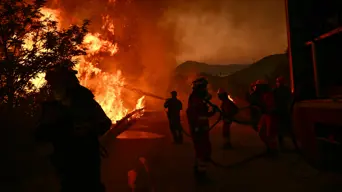Spain suffers third wildfire death, Greece beats back flames
AFP
15 August 2025 | 4:10The extreme summer heat, which scientists say human-driven climate change is lengthening and intensifying, has fuelled blazes and stretched firefighters across the region, including Portugal and the Balkans.

Firefighters work to extinguish a wildfire near the city of Patras, western Greece on 13 August 2025. Picture: AFP
MADRID - Spain on Thursday mourned its third wildfire death this week and Greece began beating back a blaze threatening its third-largest city as an unrelenting heatwave stoked tinderbox conditions in southern Europe.
The extreme summer heat, which scientists say human-driven climate change is lengthening and intensifying, has fuelled blazes and stretched firefighters across the region, including Portugal and the Balkans.
The fires have particularly scorched Spain, devouring over 157,000 hectares (388,000 acres) this year - more than triple the area burned during the same period in 2024.
Spanish authorities said one person battling flames in the northwestern Castile and Leon region had died, taking the toll to three after earlier reporting fatalities there and near Madrid this week.
Climate change is fuelling larger, more intense wildfires like those in Spain that can alter upper-atmosphere dynamics and create unpredictable winds, making fire behaviour harder to forecast, said Antonio Jordan Lopez, a wildfire expert at the University of Seville.
"Picture a fire so fierce, so fast, and so unpredictable it seems alive, capable of reshaping the weather around it and leaping across kilometres in a heartbeat," he added.
France announced it would send two water bombers to Spain, which has appealed to the European Union for aircraft to reinforce hard-pressed firefighting teams battling on several fronts, notably in the northwest.
Thousands of people have been evacuated from their homes this week in Spain because of the fires, mostly in Castile and Leon.
ARSON ARRESTS
Greece, which has also requested EU assistance against wildfires, gained ground against a major blaze that had closed in on the western port city of Patras.
Firefighters there faced "scattered" pockets of flames, but the fire was "still active" in the eastern outskirts of the city of 250,000 people, fire brigade spokesman Vassilis Vathrakogiannis said.
Some 600 ground crews and nearly 30 water bombing aircraft were deployed from dawn in all locations, he said, but gentler winds were helping the firefighting effort.
Major outbreaks also stretched emergency services on the tourist island of Zante, the Aegean island of Chios and near the western town of Preveza.
Citing data from the EU's Copernicus satellite monitoring programme, the National Observatory of Athens said those fires and the Patras blaze had burned more than 10,000 hectares.
Authorities said three men aged 19 to 27 had been detained on suspicion of starting some of the fires around Patras on Tuesday.
Spanish investigators said Thursday they had arrested four people suspected of starting forest fires, taking the total number of accused this summer to 30.
‘IT WAS FRIGHTENING'
Portugal mobilised more than 1,900 firefighters against four major blazes, with one in the central area of Trancoso having razed an estimated 14,000 hectares since Saturday.
Another front that broke out on Wednesday in the mountainous central Arganil area occupied more than 800 firefighters.
"The flames were enormous... it was frightening," a woman in the village of Mourisia told Sic Noticias television as she gazed at a slope enveloped in thick smoke.
Although vulnerable and elderly people had been evacuated as a precaution, Antonio Silva refused to leave the village overnight.
"I wanted to be here to help," said the man in his 70s, his face shielded with a mask.
Expecting tough conditions Friday, the government has extended a state of alert until Sunday, Interior Minister Maria Lucia Amaral said.
The measures bar access to forest areas, suspend some farm work and ban fireworks.
The Balkans appeared to have overcome the worst of an exceptionally strong heatwave that worsened its traditional fire season, destroying homes and prompting the evacuation of thousands.
Albanian firefighters continued to struggle against blazes around the country, with reports of more homes lost overnight.
In neighbouring Montenegro, easing conditions and water-bombing aircraft helped gain the upper hand against wildfires.
Tourist hotspots Rome and Venice were among 16 Italian cities placed on red alert for extreme heat, with peaks of 39 Celsius predicted for Florence on the eve of a busy holiday weekend.
Get the whole picture 💡
Take a look at the topic timeline for all related articles.

















